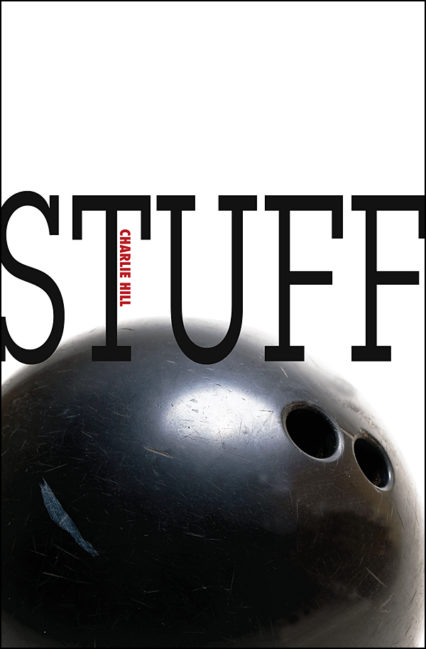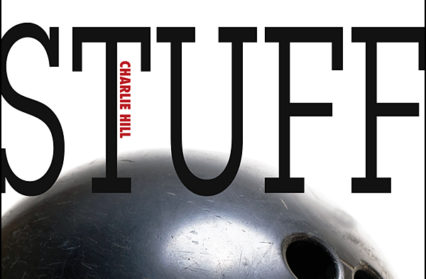David Rose reviews Stuff, a novella by Charlie Hill which offers a uniquely captivating portrayal of consumerism in modern Britain.
In his brief story ‘The Ramble’, describing a walk along a mountain path, Robert Walser encounters a train, a river, clouds, other walkers, a few carts and some children, and concludes (in Tom Whalen’s translation): ‘We don’t need to see anything out of the ordinary. We already see so much.’ That sentiment animates the opening of Charlie Hill’s novella, Stuff, putting it in the genre of Urban Hyperrealism; life as a series of Joycean epiphanies.
along a mountain path, Robert Walser encounters a train, a river, clouds, other walkers, a few carts and some children, and concludes (in Tom Whalen’s translation): ‘We don’t need to see anything out of the ordinary. We already see so much.’ That sentiment animates the opening of Charlie Hill’s novella, Stuff, putting it in the genre of Urban Hyperrealism; life as a series of Joycean epiphanies.
It starts then, with a walk, not along a mountain path but on Woodthorpe Road in a suburb of Birmingham, to a local supermarket, a walk of half a mile and an almost perpetual epiphany: a surf of detergent spume from a carwash; a hole in the road, exposing alien-coloured soil; learner drivers; lime tree roots fracturing the pavement… We see so much, as the narrator does, in a blaze of life, a secular enthusiasm (using the word in its original sense).
But, what happens to a life when the epiphanies dry up, turn to dust in the existentialist entropy? When the realisation strikes home that a similar walk, from the supermarket to home, had been accomplished automatically, with no consciousness of it until it was over?
On Tuesday, the day after it dawns on the narrator that his blaze of life is dying, he becomes – paradoxically – more aware of his work environment, a state he has previously resisted because ‘blazing at work leads to promotion or the sack and I didn’t fancy either…’ Charlie Hill’s account of office life, the forced camaraderie, the social strategies for getting by, are particularly effective, explaining the sudden cumulative effect of the sense of entrapment in deadening, blaze-extinguishing routine.
That deadening extends to his relationship with his girlfriend, whom he visits on the Wednesday, recognising another routine, a comfortable one but spiritually stifling in that he finds he can’t talk to her about that dying of his inner ‘candescence’.
On Thursday he skives off work, phones an old school friend and arranges to go bowling, as they once did regularly after school. This is one of the best, and most important, sections of the novella, a long, beautifully depicted account of their bowling match. This match, arranged on impulse, bears much of the weight of the novella’s argument.
It bears that weight because its significance to the narrator is left unexplained. At a point in the match, his friend asks ‘What’s brought this on?’
I said: What do you mean?
This. Bowling. It’s a bit nostalgic, isn’t it? And that’s not really your thing, is it?
Nah, mate, it isn’t.
Later in the match, his friend asks again: ‘Are you alright mate?‘
I said: Yeah. I’m fine.
He said: I mean this isn’t about… what went on?
No.
Oh. OK.
He looked at me again. Now he understood. It hadn’t taken long. That’s why he was my best friend.
So what has brought it on? We can’t say. His friend may understand but we don’t; it can’t be explained, only depicted, in hypnotic detail:
I put my thumb back in the thumb hole and sent my medium ball straight down the middle of the lane. I thought it was going to be too straight, that it would hit the top pin too squarely, but it didn’t, the slight curve of the lane took the ball off the straight line by just enough and it caught the top pin perfectly.
After his friend leaves, the narrator decides to play on his own. As he does so, he is confronted by two schoolboys.
B and J took a step backward into the next alley and now they looked a little nervous. I walked into their lane. I turned away from them. I walked to the top of their lane and bowled my ball. I didn’t get a strike, but it didn’t matter. I knocked over eight of their pins. I’m bowling, I said, that’s what I’m doing, I’m bowling. And for a moment, before I realised I needed to get out of the bowling alley and go home, without going to look at the mini-weirs of the mighty river Rea, that was all that mattered.
It’s all that matters to us too, because there is an implicit argument whose weight we are aware of, but a psychological rather than narrative argument.
And that is true of the events over the weekend: smashing his china and furniture; cleaning up the mess then meticulously cleaning his flat; the decision to buy a train ticket to… anywhere; Scotland; the furthest point on the mainland, necessitating a bus from Thurso to Brough, then a walk to Dunnet Head – cliffs, a puffin colony, the possibility of a long run off a short cliff, arrested by contemplation of a burial mound on the road to Dunnet Head…
The whole experience of the dying blaze, in fact, can only be described, not explained – or maybe, explained negatively, as the shape within the depiction, delineated by the particular and sharply observed detail.
And that is the accomplishment of Stuff – like a perfect bowl, the bias precisely but intuitively calculated, the pins toppling in the swerve.
It’s helped by its length. Comfortably read and absorbed in a sitting, it is, at 37 pages, more a long short story than a novella, and, while a perfect length for a reader, a difficult length for publishers. So Cinnamon Press are to be congratulated, and thanked, for setting up the enterprising Liquorice Fish imprint to accommodate riskier forms, and for lavishing the same care in printing and design as for a full length novel. It’s an imprint that deserves investigation, starting with Stuff: witty, beautifully detailed and compelling in its depiction of a modern alienation.
Charlie Hill











